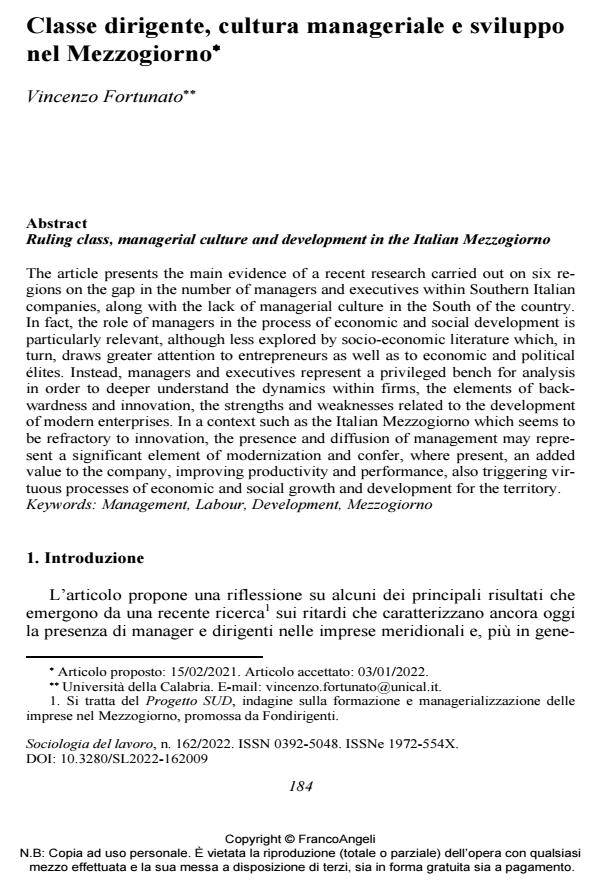Classe dirigente, cultura manageriale e sviluppo nel Mezzogiorno
Titolo Rivista SOCIOLOGIA DEL LAVORO
Autori/Curatori Vincenzo Fortunato
Anno di pubblicazione 2022 Fascicolo 2022/162
Lingua Italiano Numero pagine 24 P. 184-207 Dimensione file 290 KB
DOI 10.3280/SL2022-162009
Il DOI è il codice a barre della proprietà intellettuale: per saperne di più
clicca qui
Qui sotto puoi vedere in anteprima la prima pagina di questo articolo.
Se questo articolo ti interessa, lo puoi acquistare (e scaricare in formato pdf) seguendo le facili indicazioni per acquistare il download credit. Acquista Download Credits per scaricare questo Articolo in formato PDF

FrancoAngeli è membro della Publishers International Linking Association, Inc (PILA), associazione indipendente e non profit per facilitare (attraverso i servizi tecnologici implementati da CrossRef.org) l’accesso degli studiosi ai contenuti digitali nelle pubblicazioni professionali e scientifiche.
L’articolo analizza alcuni dei principali risultati che emergono da una recente ricerca sulla presenza di manager e dirigenti nelle imprese meridionali e, più in generale sulla scarsa diffusione della cultura manageriale al Sud. Il ruolo svolto dai dirigenti d’impresa nello sviluppo del Mezzogiorno è un tema tanto rilevante quanto poco o affatto esplorato dalla letteratura socioeconomica che focalizza, invece, l’attenzione soprattutto sul ruolo degli imprenditori, dei sindacati e delle istituzioni. I manager e i dirigenti aziendali costituiscono, invece, un banco di analisi privilegiato e utile a comprendere le dinamiche all’interno delle imprese, le tensioni con l’imprenditore, gli elementi di arretratezza e innovazione, le potenzialità e i vincoli allo sviluppo di imprese moderne, competitive e in grado di affrontare con successo le sfide dei mercati globali. Utilizzando i dati, l’obiettivo è quello di approfondire la nostra conoscenza sul ruolo del management; di comprendere se e in quale misura la diffusione della cultura manageriale rappresenta un fattore in grado di influire sullo sviluppo; attraverso quali politiche e interventi è possibile rimuovere gli ostacoli e promuovere lo sviluppo della cultura manageriale nelle realtà del Mezzogiorno; qual è il ruolo dei contesti locali e degli altri attori dello sviluppo.
Parole chiave:management, lavoro, sviluppo, Mezzogiorno
Vincenzo Fortunato, Classe dirigente, cultura manageriale e sviluppo nel Mezzogiorno in "SOCIOLOGIA DEL LAVORO " 162/2022, pp 184-207, DOI: 10.3280/SL2022-162009